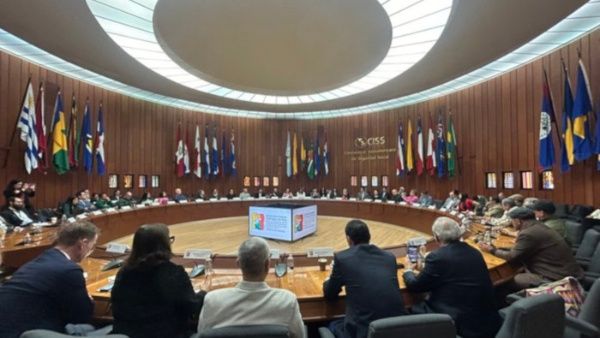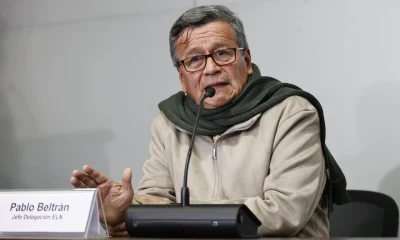International
Fifth cycle of peace talks between the Colombian Government and the ELN come to an end

December 18 |
The fifth cycle of peace talks between the Government of Colombia and the National Liberation Army (ELN) concluded this Sunday in Mexico City with six agreements that reinforce the willingness of the two parties to move forward in the negotiations, which began last year.
Of the agreements, the first is a reaffirmation of the agreement reached here in Mexico last March. Two, the suspension of withholdings for economic purposes as part of the extension of the ceasefire that ends in January and will now be extended.
Three, the creation of conditions for the extension of the ceasefire, a verification mechanism and measures against the actions of paramilitary forces and armed groups. Four, the creation of economic and financial conditions to materialize the Mexico agreement.
Five, the resumption of the process of participation of society to be designed in April of next year. Six, the creation of eight critical zones of humanitarian action. It was announced that the sixth cycle of dialogues will be held in Cuba on January 22.
The head of the government delegation, Vera Grabe, also announced that other agreements are the extension of the ceasefire, the creation of an observatory to work on the issue of paramilitarism, the consolidation of 8 peace zones, humanitarian actions for ELN political prisoners and the provision of information on people in captivity.
For his part, the head of the ELN delegation, alias Pablo Beltrán, affirmed that the guerrillas and the Colombian government are pursuing the same goal: peace.
“We are partners, we are responsible for building that mandate,” he stressed at the same event.
For this reason, he affirmed that the Peace Dialogues are a contribution to change the culture of confrontation and to seek conciliation in the South American country.
However, he pointed out that it is difficult to advance in the construction of peace when there are media wars and progress is forgotten, focusing only on conflicts and tensions.
“We delegations express our recognition and gratitude to the people and government of the United Mexican States, for their support to this process and for having hosted the V Cycle of Dialogues for Peace,” both delegations indicated after the closing ceremony of the event.
They also thanked Cuba for its support to this process and announced that the country will host the VI Cycle starting on January 22, 2024 and that it will facilitate the Inter-Cycle Contact Point of the Dialogue Table.
The text of the agreements was read in a ceremony attended by senior Colombian government officials, leaders of the ELN mission, guests from the group of guarantor countries, representatives of the United Nations and the Colombian Catholic Church, among others.
The guarantor countries are represented by Brazil, Cuba, Chile, Mexico, Norway and Venezuela, the permanent accompaniers are the Colombian Episcopal Conference and the UN Secretary General, in addition to the Group of Accompanying, Support and Cooperation Countries (GPAAC), made up of Germany, Spain, Sweden and Switzerland.
International
U.S. Senate Rejects Budget, Bringing Government Closer to Shutdown Amid DHS Dispute

The U.S. Senate voted on Thursday against a budget proposal in a move aimed at pressuring changes at the Department of Homeland Security (DHS), following the killing of two civilians during a deployment of immigration agents in Minneapolis.
All Senate Democrats and seven Republican lawmakers voted against the bill, which requires 60 votes to advance, pushing the country closer to a partial government shutdown that would cut funding for several agencies, including the Pentagon and the Department of Health.
The rejection came as Senate leaders and the White House continue negotiations on a separate funding package for DHS that would allow reforms to the agency. Proposed measures include banning Immigration and Customs Enforcement (ICE) agents from wearing face coverings and requiring them to use body-worn cameras during operations.
The vote took place just hours after President Donald Trump said he was “close” to reaching an agreement with Democrats and did not believe the federal government would face another shutdown, following last year’s record stoppage.
“I don’t think the Democrats want a shutdown either, so we’ll work in a bipartisan way to avoid it. Hopefully, there will be no government shutdown. We’re working on that right now,” Trump said during a Cabinet meeting at the White House.
International
Trump Says Putin Agreed to One-Week Halt in Attacks on Ukraine Amid Extreme Cold

U.S. President Donald Trump said on Thursday that he secured a commitment from Russian President Vladimir Putinto halt attacks against Ukraine for one week, citing extreme weather conditions affecting the region.
“Because of the extreme cold (…) I personally asked Putin not to attack Kyiv or other cities and towns for a week. And he agreed. He was very pleasant,” Trump said during a Cabinet meeting broadcast by the White House.
Trump acknowledged that several advisers had questioned the decision to make the call.
“A lot of people told me not to waste the call because they wouldn’t agree. And he accepted. And we’re very happy they did, because they don’t need missiles hitting their towns and cities,” the president said.
According to Trump, Ukrainian authorities reacted with surprise to the announcement but welcomed the possibility of a temporary ceasefire.
“It’s extraordinarily cold, record cold (…) They say they’ve never experienced cold like this,” he added.
Ukrainian President Volodymyr Zelensky later commented on the announcement, expressing hope that the agreement would be honored.
International
Storm Kristin Kills Five in Portugal, Leaves Nearly 500,000 Without Power

Storm Kristin, which battered Portugal with heavy rain and strong winds early Wednesday, has left at least five people dead, while nearly half a million residents remained without electricity as of Thursday, according to updated figures from authorities.
The revised death toll was confirmed to AFP by a spokesperson for the National Emergency and Civil Protection Authority (ANPEC). On Wednesday, the agency had reported four fatalities.
Meanwhile, E-Redes, the country’s electricity distribution network operator, said that around 450,000 customers were still without power, particularly in central Portugal.
Emergency services responded to approximately 1,500 incidents between midnight and 8:00 a.m. local time on Wednesday, as the storm caused widespread disruptions.
The Portuguese government described Kristin as an “extreme weather event” that inflicted significant damage across several regions of the country. At the height of the storm, as many as 850,000 households and institutions lost electricity during the early hours of Wednesday.
Several municipalities ordered the closure of schools, many of which remained shut on Thursday due to ongoing adverse conditions.
Ricardo Costa, regional deputy commander of the Leiria Fire Brigade, said residents continue to seek assistance as rainfall persists.
“Even though the rain is not extremely intense, it is causing extensive damage to homes,” he noted.
In Figueira da Foz, a coastal city in central Portugal, strong winds toppled a giant Ferris wheel, underscoring the severity of the storm.
-

 Central America4 days ago
Central America4 days agoGuatemala seizes over a ton of cocaine hidden in flour at Pacific port
-

 International4 days ago
International4 days agoHistoric snowstorm paralyzes Toronto after 60 centimeters of snow
-

 Central America3 days ago
Central America3 days agoGuatemala Police Arrest Prison Guard Caught in the Act of Extortion
-

 Central America3 days ago
Central America3 days agoHonduras swears in conservative president Asfura after disputed election
-

 Central America3 days ago
Central America3 days agoBukele leads public trust rankings as UCA survey highlights gains in security
-

 International4 days ago
International4 days agoSpain’s irregular migrant population rises to 840,000, study finds
-

 International2 days ago
International2 days agoFootball Fan Killed in Clashes After Colombian League Match
-

 International3 days ago
International3 days agoWinter Storm Fern Leaves 30 Dead and Over One Million Without Power Across the U.S.
-

 Central America2 days ago
Central America2 days agoGuatemala President Says Starlink Terminal Found Inside Prison
-

 Sin categoría3 days ago
Sin categoría3 days agoEight Killed in Series of Armed Attacks in Ecuador’s Manabí Province
-

 International3 days ago
International3 days agoDoomsday clock moves to 85 seconds before midnight amid rising global risks
-

 International4 days ago
International4 days agoRights group says nearly 6,000 killed in Iran protest crackdown
-

 International3 days ago
International3 days agoSpain approves plan to regularize up to 500,000 migrants in Historic Shift
-

 Sin categoría3 days ago
Sin categoría3 days agoEl Salvador Launches Fourth Year of Ocean Mission to Protect Marine Ecosystems
-

 International2 days ago
International2 days agoRubio Says U.S. Could Participate in Follow-Up Russia-Ukraine Talks
-

 International2 days ago
International2 days agoMissing Spanish Sailor Rescued After 11 Days Adrift in Mediterranean
-

 International4 days ago
International4 days agoVenezuela frees at least 80 political prisoners, NGO says
-

 International4 days ago
International4 days agoEU launches new probe into X over AI-generated fake nude images
-

 International17 hours ago
International17 hours agoU.S. Senate Rejects Budget, Bringing Government Closer to Shutdown Amid DHS Dispute
-

 International4 days ago
International4 days agoSevere winter storm grips U.S., leaves multiple dead as extreme cold persists
-

 International4 days ago
International4 days agoFrance debates ban on social media for children under 15
-

 International17 hours ago
International17 hours agoStorm Kristin Kills Five in Portugal, Leaves Nearly 500,000 Without Power
-

 International17 hours ago
International17 hours agoMan Arrested After Vehicle Crashes Into Jewish Institution in Brooklyn
-

 International17 hours ago
International17 hours agoTrump Says Putin Agreed to One-Week Halt in Attacks on Ukraine Amid Extreme Cold
































